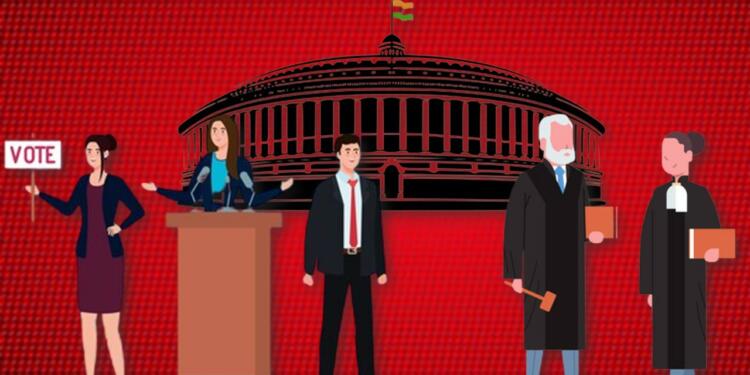The legislature and judiciary are considered two important pillars of democracy. Consequently, democratic norms require that officers of both branches be granted some privilege. In India, these privileges are allocated to advocates and parliamentarians.
Advocates have absolute privilege
Recently, during the course of hearing, a few remarks of a Senior Advocate did not go down well with a businessman. Offended businessmen filed a defamation suit against the advocate. He sought Rs. 2 crore in compensation for, quote, “loss and harm caused to his reputation and goodwill.” His counsel argued that there is no statutory right granting absolute privilege to an advocate. The respondent argues against it.
The Delhi High Court upheld the freedom of speech privilege of the advocacy profession. Justice Mini Pushkarna even refused to look into the irrelevance or maliciousness of the statement.
The Court observed that court hearings are privileged occasions. Any statement made during those moments can’t be held to be eligible for libel or slander. Therefore, advocates can’t be put on trial for defamation. Justice Mini reasoned that “the justice system would be adversely affected if lawyers were to be in fear of the law themselves.”
Also read: Bombay High Court: Teacher Discipline Not a Criminal Offense under Section 324 IPC
She also expressed the fear that if such privileges were not provided, the system of justice would literally come to a halt since advocates would think more about their own protection than that of their clients. The same principles have previously been upheld in cases like the M.K. Parameswara Kurup, M.L. Ganesh, and B. Sumat Prasad Jain.
Corresponding rights of Parliamentarians
This almost absolute freedom of speech is not guaranteed to everyone in India. Apart from advocates, only public representatives have this right. Article 105(2) of the Indian Constitution provides it for parliamentarians. It explicitly states that a parliamentarian can literally say anything on the red carpet, and courts have no power to put him or her on trial for it.
In other words, no defamation suit can be filed against parliamentarians for anything they say on the floor of the parliament. Only the rules established by the respective houses can put a stop to it. In practical terms, only the expunction of remarks and temporary suspension from parliamentary proceedings are observed.
Also read: Right to Vote in India is a Stormy Sea of Confusion
However, there is one rule that they have to abide by. Under Article 121, the rule is not to discuss the conduct of any High Court or Supreme Court Judge in the discharge of his duties. That is allowed only when there is a motion for the removal of that particular judge.
Other privileges
Similarly, both branches of democracy enjoy their respective privileges from arrest as well. Section 135 of the Civil Procedure Code, 1908, states that advocates cannot be arrested in civil cases, whether they are travelling to or from court or participating in court proceedings. This protection does not extend to criminal cases or instances of contempt of court.
For parliamentarians, the privilege of freedom from arrest depends on the date on which the house ends its proceedings. A Parliamentarian can’t be arrested in a civil case 40 days before or after the adjournment of proceedings. Furthermore, he or she cannot be arrested in Parliament.
Then Parliamentarians and advocates have no legal compulsion to do their designated work. If Parliamentarians don’t fulfil their promises, then they can’t be put on trial for that. Similarly, last year, the Karnataka High Court held that a litigant can’t sue his lawyer for cheating or fraud just because he lost the case. Apart from these recognised ones, there are some other social privileges that both advocates and Parliamentarians enjoy.
Support TFI:
Support us to strengthen the ‘Right’ ideology of cultural nationalism by purchasing the best quality garments from TFI-STORE.COM
Also Watch:
https://www.youtube.com/watch?v=snZ68yEkaII

























